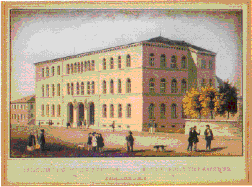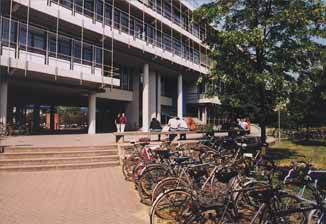The Operating Systems Group at the University of Karlsruhe
 |
The University of Karlsruhe, founded on 7 October 1825, started its work in 1832 as a polytechnical school. In 1865 it fulfilled all the requirements of a university and became a "Technische Hochschule". 1967 it was renamed "Universität Karlsruhe (TH)". The computer science department was founded in 1972 (the first one in Germany). The computing center of the university is one of the largest and most modern among German universities. It started using supercomputers in the early eighties. Karlsruhe was the trendsetter for the introduction of computerised lecture halls and the university itself installed the first high speed network in Europe. The computer science department covers a wide area in computing research, e.g. theoretical aspects as well as hardware and software design and implementation. |
| One of the first professors of the department was Prof. Dr. Horst Wettstein, head of the operating system research group until September 1998. The main emphasis was on architectural principles, i.e. how to build operating systems using well structured and well understood concepts. Besides general architectural issues, the group pursued as the major research directions: system architecture, scheduling for real time systems, adaptive systems, and systems for parallel computers. |
|
Since April 1999, the research group had a new head, Prof. Dr. Jochen Liedtke, and a new title, System Architecture. The research activities include microkernel construction, highly configurable systems, and high performance I/O. However, Prof. Dr. Jochen Liedtke passed away unexpectedly on June 10th, 2001. In the following years, the research group has focused on microkernel based operating systems (L4Ka project). Microkernel based systems are a promising approach to control the increasing complexity of operating systems. Main research topics are microkernels at the base of multiserver operating systems, structure and construction principles of such systems, and virtual machine systems (VM systems) as a concrete class of multiserver operating systems. |
 |
|
From the end of 2004 until the end of 2009 Dr. Thomas Fuhrmann's research group "Peer-to-peer Computing" enlarged the system architecture group. Unlike classical client-server architectures peer-to-peer computing draws on the functional equivalence of all the computing nodes, another well-known principle in distributed systems. Since December 2004, the system architecture group has a head again, Prof. Dr. Frank Bellosa. His principle field of interest is OS-directed power management for energy-aware systems. Additional research topics are coming up: Server Power Management, I/O Power Management, and Dynamic Frequency Scaling. In 2014, the system architecture group was redefined as operating systems group and integrated into the Institute of Computer Engineering. |
